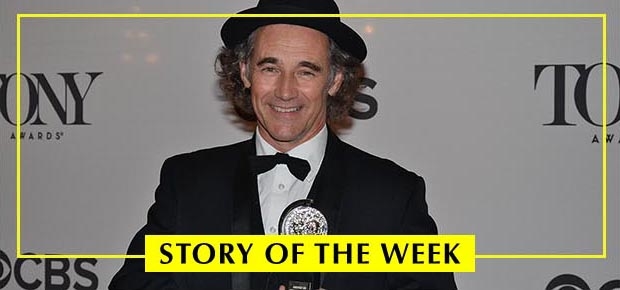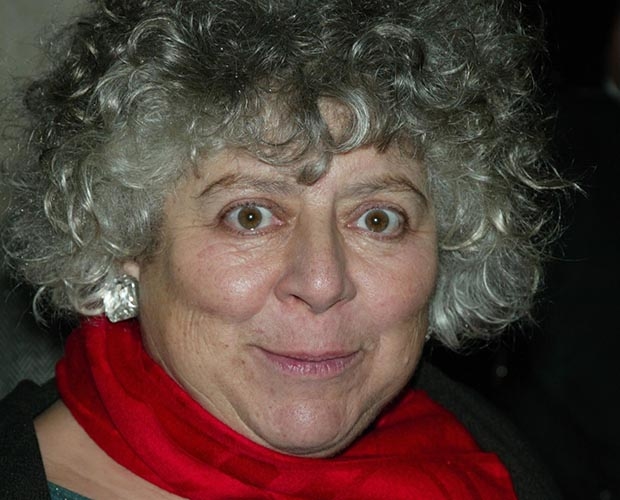Can a Tony-Winning Actor Shame the Royal Shakespeare Company Into Shunning Oil Money?
Mark Rylance quit the Royal Shakespeare Company over its ties with BP. Will other actors follow his lead?

(© David Gordon)
On June 21, three-time Tony-winning actor Mark Rylance announced that he was resigning his position as an associate artist with the Royal Shakespeare Company (RSC) over the theater's partnership with multinational oil and gas company BP.
BP is one of the largest firms in the world, with annual profits exceeding $12 billion. It has committed a small portion of those profits to providing £5 (or about $6.30) tickets to RSC shows for 16- to 25-year-olds (regularly priced tickets can run up to £75). By BP's own estimation, 10,000 subsidized tickets are annually sold through this "scheme" (a delightfully telling bit of British parlance).
BP is also, infamously, the company behind the Deepwater Horizon oil disaster of 2010, in which nearly 5 million barrels of oil were discharged into the Gulf of Mexico, resulting in lasting ecological damage. As a leading petroleum company, it is one of the single largest contributors of greenhouse gas emissions, a driving factor in climate change. Is this really about helping poor kids go to the theater, or is it a clever bit of PR for a company whose business model is cooking us all alive?

(© U.S. Coast Guard)
Story of the Week will explore the relationship between the RSC and BP, why actors like Rylance object to it, and what (if any) effect the rift is likely to have on the future of corporate sponsorship of the arts.
Who is Mark Rylance?
Rylance is best known to American audiences for his Tony-winning performances in Boeing-Boeing, Jerusalem, and Twelfth Night. He also won an Oscar for his performance in the 2015 Steven Spielberg film, Bridge of Spies. Television audiences might recognize him as Thomas Cromwell from the BBC miniseries Wolf Hall.
Like a lot of great actors, Rylance got his start in the theater. One of the venues where he cut his teeth was the RSC, where he played both Hamlet and Romeo. Rylance is one of the most talented Shakespeareans of our age, and also something of an eccentric (see the Tony acceptance speech below).
This is not the first time that Rylance has questioned the relationship between the RSC and BP, which stretches back to 2012 — shortly after the Deepwater Horizon spill.
What is the relationship between the Royal Shakespeare Company and BP?
In 2012, BP sponsored the World Shakespeare Festival (of which RSC was a major participant), raising the eyebrows of several British artists, including Rylance. While BP no longer directly underwrites RSC productions, it does subsidize tickets for young theatergoers under the aforementioned "scheme." This arrangement is set to continue through 2022, helping younger and poorer audiences see theater, while simultaneously allowing BP to look like a benevolent benefactor of the arts. For Rylance, these cheap tickets come at the cost of the theater's moral authority.
He writes, "The RSC will continue pushing BP's brand on to a generation of young people who have — in huge numbers through the ongoing school strikes — told adults they need to step up their response to the climate crisis now." He also puts BP in league with arms dealers and tobacco companies: firms whose activities are deleterious to human life. This obviously impressed 16-year-old Swedish climate activist Greta Thunberg (a major organizer of those school strikes).
"… I do not wish to be associated with BP any more than I would with an arms dealer, a tobacco salesmen or any company or individual who willfully destroys the lives of others alive and unborn."
This is what a role model looks like in 2019. https://t.co/Ts4x51Skdg
— Greta Thunberg (@GretaThunberg) June 26, 2019
Are other actors following his lead?
So far, only Miriam Margolyes (best known for playing Professor Sprout in the Harry Potter films) has publicly joined Rylance in his boycott of the RSC. "I would turn them down as long as they are supporting something that is doing harm to the world," she told the BBC last week.
But not every performer agrees with Rylance's tactics. In a scathing letter to The Times, Maureen Lipman (Coronation Street) called Rylance "jolly silly" for resigning, suggesting that if he wants to really make a difference, he should follow Glenda Jackson's lead and run for parliament. "If she can come back and win a Tony Award on Broadway (after serving as an MP) I feel sure that Sir Mark could find himself a nice rotten borough or two to put his mouth where his petroleum coupons are," she wrote. Certainly, the addition of Rylance's surreal oratory couldn't make parliament any sillier than it already is.

(© Joseph Marzullo)
Will Rylance's boycott make a difference?
The RSC has said little of Rylance's decision other than they were "saddened" by it. While his public rebuke may have created a round of bad publicity for the company, it is unlikely to significantly impact its programing since Rylance has not appeared on their stage since 1989.
Still, with their public calls for boycott, Rylance and Margolyes have posed a challenging question to the RSC: Who do you value more — your corporate sponsors or your performers? A belief in the influence of the latter may lead other climate-conscious actors to exeunt stage left, but I suspect that the fear that the answer is quietly the former will prompt most performers to stay put (especially when there are so many underemployed actors ready and willing to take their place).
That doesn't negate the fact that, by confronting his former artistic home so publicly, Rylance is bringing to the stage the fight against "artwashing" (when companies and individuals seek to distract from the controversial sources of their wealth through charitable donations to cultural institutions). There is already a major movement against "artwashing" in the visual arts world: Earlier this year, photographer Nan Goldin staged a "die-in" at the Guggenheim to protest the museum's acceptance of donations from the Sackler family, whose company (OxyContin manufacturer Purdue Pharma) is viewed as a major contributor to the opioid epidemic. A month later, the Guggenheim swore off future donations from the Sacklers.
A greater awareness on the part of both artists and audiences of the source of funding is a good thing for the theater, especially when the "woke" material being presented clashes with the capital used to finance it. This is a particularly glaring discrepancy in New York, where not-for-profit theaters presenting new plays by committed socialists receive generous underwriting from major banks and credit cards.
Those theaters are in the unenviable position of having to decide if it is better to accept tainted money to support important art, or forswear that money at the risk of presenting a thinner season (less work onstage means fewer paychecks for working artists). It's a delicate dance that art institutions will continue to perform as long as companies like BP and Purdue Pharma continue to command huge amounts of money — but that doesn't mean that artists and audiences shouldn't say anything about it.







